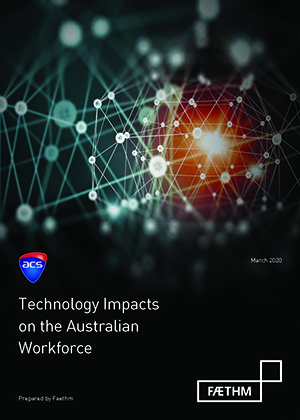We have implemented new login procedure. Learn More
Technology Impacts on the Australian Workforce
The report Technology Impacts on the Australian Workforce highlights the significant and far-reaching impact of emerging technologies on the Australian workforce in the next fifteen years and how growing technological capabilities are already transforming supply chains, reshaping the workforce and redefining jobs.
This report reveals:
how your industry, occupation and role will be affected by automation and augmentation in the near future
deep insights for businesses to inform future workforce development plans
ways for policy makers to maximise the participation rate of all citizens with regards to opportunities afforded by the Fourth Industrial Revolution
More about this report
Prepared by artificial-intelligence (AI) analytics platform Faethm in conjunction with ACS, the report finds that 2.7 million Australian jobs are at risk from automation by 2035, but more than twice as many jobs can be created if Australia decides to invest in the skills development of its workforce.
As jobs are augmented by technology, the tasks performed by a range of workers across the labour market are evolving at an unprecedented rate, driving demand for new skillsets. Education and re-skilling the Australian workforce will be crucial in preventing long-term structural unemployment and rising inequality. We need to enable continuous learning programs that provide real-time skills acquisition, on-the-job training, and experience-based rapid knowledge transfer, to transition our workforce from declining to emerging opportunities.
Emerging technologies are transforming all industry sectors, displacing over 600,000 Australian workers by 2021. However, this technological transformation being driven by the Fourth Industrial Revolution will also create new and exciting opportunities. Over the next 15 years, an additional 5.6 million new jobs could be added to the Australian economy and 25% of these new jobs will be technology-related roles. Globally, other nations’ investments in skills development and transition to date far outweigh Australia’s spending. ACS calls for a macro, cross-policy approach to be adopted by government to ease the impact on the workforce and address any resulting skills shortages.

